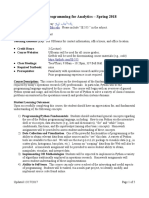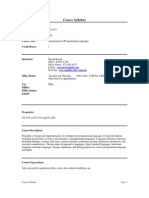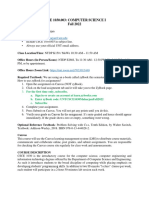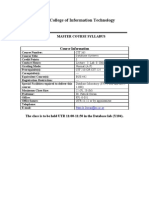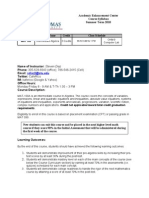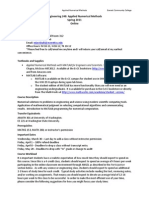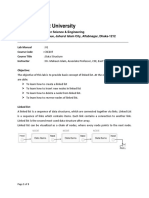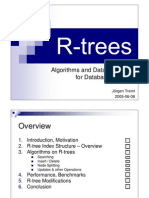Course Syllabus: General Information
Course Syllabus: General Information
Uploaded by
Cristy Balubayan NazarenoCopyright:
Available Formats
Course Syllabus: General Information
Course Syllabus: General Information
Uploaded by
Cristy Balubayan NazarenoOriginal Description:
Original Title
Copyright
Available Formats
Share this document
Did you find this document useful?
Is this content inappropriate?
Copyright:
Available Formats
Course Syllabus: General Information
Course Syllabus: General Information
Uploaded by
Cristy Balubayan NazarenoCopyright:
Available Formats
CS 245 DATA S TRUCTURES AND A LGORITHMS
P ROFESSOR E NGLE · S PRING 2011
Course Syllabus
Spring 2011
General Information
CS 245 – Data Structures and Algorithms
Spring Semester 2011
Harney Science Center · Room 235
Mondays & Wednesdays · 2:15pm – 4:35pm
Website:
http://www.cs.usfca.edu/~sjengle/courses/spring2011/cs245/
http://blackboard.usfca.edu/bin/common/course.pl?course_id=_40864_1
Mailing List:
cs245@cs.usfca.edu · https://cs.usfca.edu/mailman/listinfo/cs245
Announcements:
Announcements will be posted on Twitter account sjengle using hashtag #cs245. You may view these
at http://twitter.com/#search?q=from%3Asjengle%20%23cs245 or on the course website.
Calendar:
Lectures, assignment deadlines, and exam dates will be posted on the public Google Calendar for this
course. See the course website for more details.
Description:
In this class, students will learn, implement, and analyze several types of data structures and algorithms
using a mix of programming and theory.
Pre-Requisites:
CS 112 – Introduction to Computer Science II, MATH 201 – Discrete Math
Required Materials
We will be using the book “A Practical Introduction to Data Structures and Algorithm Analysis” by Clifford
A. Shaffer (Java Version, Edition 3.1), which is available to download for free at:
http://people.cs.vt.edu/~shaffer/Book/
Do not purchase the print edition of this book. We will be using the Java version of the newest edition,
which is only available online.
CS 245 DATA STRUCTURES AND ALGORITHMS · SPRING 2011 · PROFESSOR ENGLE
COURSE SYLLABUS PAGE 2
Instructor
Professor Sophie Engle
sjengle@usfca.edu · http://www.cs.usfca.edu/~sjengle/
Office Hours:
Harney Science Center · Room 140B
Mondays & Wednesdays 4:45pm – 5:45pm
Tuesdays 11:45am – 12:45am (or by appointment)
Teacher Assistant
Shah N. El-Rahman · snelrahman@usfca.edu
Teacher assistant’s office hours to be announced.
Topics and Schedule
We will cover several types of data structures and algorithms, including (in no specific order):
• Basic Data Structures
Stacks, Queues, Arrays, Linked Lists, etc.
• Analysis of Algorithms
Rates of Growth: O(n), Ω(n), Θ(n), o(n), ω(n), Run-Time Complexity, Space Complexity,
NP -Completeness (Time Permitting), etc.
• Sorting Algorithms
Insertion Sort, Selection Sort, Merge Sort, Quicksort, Heapsort, Bucket Sort, Radix Sort, etc.
• Hash Tables
Hash Functions, Open Hashing, Closed Hashing, etc.
• Trees
Binary Trees, Binary Tree Manipulation, Ordered Binary Trees, Binary Search Trees, Heaps
and Priority Queues, AVL Trees, B Trees, etc.
• Graphs and Graph Algorithms
Dijkstra’s Algorithm, Prim’s Algorithm, Kruskal’s Algorithm, Depth-First vs Breadth-First
Search, Connected Components, Maximum Flow, etc.
• Dynamic Programming
Knapsack Problem, All-Pairs Shortest Path, etc.
There will be either a homework assignment, project, or exam due every week. There are two midterm
exams (on weeks 7 and 13) and one final exam.
This is subject to change at any time. Please see the schedule on the course website for the latest.
CS 245 DATA STRUCTURES AND ALGORITHMS · SPRING 2011 · PROFESSOR ENGLE
COURSE SYLLABUS PAGE 3
Learning Outcomes
At the end of this course, students should have the following knowledge and skills:
• Understand and analyze the time and space complexity of an algorithm
• Understand, implement, and compare fundamental data structures
• Understand and implement fundamental algorithms
(including sorting algorithms, graph algorithms, and dynamic programming)
• Write larger and more complex Java applications
Grading
The final grade will be calculated as follows:
5% Participation
10% Homework
30% Projects
30% Midterm Exams (2)
25% Final Exam
Letter grades will be assigned according to the following scale:†
†
A+ ≥ 97.0% C ≥ 73.0% Note that this scale is subject to change at any time.
A ≥ 93.0% C− ≥ 70.0%
A− ≥ 90.0% D+ ≥ 67.0%
B+ ≥ 87.0% D ≥ 63.0%
B ≥ 83.0% D− ≥ 60.0%
B− ≥ 80.0% F < 60.0%
C+ ≥ 77.0%
Participation
Participation points may be earned by participating in discussions on the mailing list and in class.
Homework
There will be a mix of programming and written homework assignments, assigned every 1–2 weeks.
Students may discuss the homework problems at a high-level (no sharing of code), but are expected to
complete the homework assignments individually. See the Academic Honesty section for the penalties
of copying work.
Projects
There will be approximately four projects. You must submit your source code to the proper subversion
repository. Specific instructions will be provided with each project assignment. Failure to follow the
submission instructions will result in point deductions.
CS 245 DATA STRUCTURES AND ALGORITHMS · SPRING 2011 · PROFESSOR ENGLE
COURSE SYLLABUS PAGE 4
There are two ways to receive a 0% on your projects: submitting your project late, or cheating. Late
submissions are not accepted, so it is important to submit code to your svn repository often. Even if you
are not finished with your project, be sure you have something submitted prior to the project deadline.
There is a zero tolerance cheating policy (detailed below). We will be running MOSS (http://theory.
stanford.edu/~aiken/moss/) to check for cheating.
Exams
There will be two midterm exams and a final exam. These exams will be closed note and closed book.
There will be a review session prior to each exam. The final exam date for this class is Monday, May 16,
2011 at 3:00pm in HR 235.
Attendance
Attendance is mandatory. Absences are only excused in cases of verified family or medical emergency.
Topics that are discussed in class but are not available online are fair game for exams.
Late Policy
All deadlines are firm. Students are responsible for meeting all homework and project deadlines.
Extensions will not be granted and late homework will not be accepted except in case of verified medical
or family emergency. You must discuss your situation with me personally before the deadline to receive
an extension. The same holds for all exams.
Academic Honesty
Simply put, do not cheat and do not plagiarize or copy (from other students or from the web). I expect
all students to adhere to the academic honesty policies at USF. More information is available in the
Fogcutter Student Handbook, available at http://www.usfca.edu/fogcutter/studentconduct/.
Students caught violating the academic honesty policy will face severe penalty. A first offense will result
in a 0 on an assignment or exam, and a report to the Dean’s office. Repeat offenses may result in an F
for the course.
This syllabus is based off previous iterations of this course developed
by Professor Galles. See http:// www.cs.usfca.edu/ ~galles/ cs245/ for more details.
CS 245 DATA STRUCTURES AND ALGORITHMS · SPRING 2011 · PROFESSOR ENGLE
You might also like
- SYSC4005 Course Outline Winter 2023Document7 pagesSYSC4005 Course Outline Winter 2023Adil MajeedNo ratings yet
- Syllabus For Buan-Opre 6398.001 - Sp22Document7 pagesSyllabus For Buan-Opre 6398.001 - Sp22SHRUTI KHANNANo ratings yet
- CSC 422 522 001Document8 pagesCSC 422 522 001Gabe OliveiraNo ratings yet
- Syllabus CIS 2353 Tues - Fa19 JPB PDFDocument6 pagesSyllabus CIS 2353 Tues - Fa19 JPB PDFWesley HartsuckNo ratings yet
- Normal Distribution Reviewer ShsDocument4 pagesNormal Distribution Reviewer ShsCristy Balubayan Nazareno100% (1)
- Ee271 01Document8 pagesEe271 01saitejagoud445No ratings yet
- COSC 2336, 01W, Data Structures and Algorithms: Instructor InformationDocument8 pagesCOSC 2336, 01W, Data Structures and Algorithms: Instructor InformationTetteh SamuelNo ratings yet
- IE 555 Syllabus Spring 2018Document5 pagesIE 555 Syllabus Spring 2018Vijay Ganesh SrinivasanNo ratings yet
- Western New England University College of EngineeringDocument5 pagesWestern New England University College of EngineeringdonjuanNo ratings yet
- SyllabusDocument4 pagesSyllabusKaushiikBaskaranNo ratings yet
- Adv Time SeriesDocument7 pagesAdv Time SeriesJ.No ratings yet
- ORI 391Q.4 - Integer Programming Spring 2011 SyllabusDocument3 pagesORI 391Q.4 - Integer Programming Spring 2011 SyllabusJoão Victor OliveiraNo ratings yet
- M 340L (Matrices and Matrix Calculations) SyllabusDocument5 pagesM 340L (Matrices and Matrix Calculations) SyllabussreeduggiralaNo ratings yet
- ME5243 Syllabus 1314FDocument3 pagesME5243 Syllabus 1314Fjoe_grnNo ratings yet
- 2018 Fall Math1b03 Courseinfo RevisedDocument6 pages2018 Fall Math1b03 Courseinfo RevisedMichaelNo ratings yet
- Syllabus Single DocumentDocument7 pagesSyllabus Single DocumentMarquise RosierNo ratings yet
- MA 242 Instructor Syllabus Fall 2020Document9 pagesMA 242 Instructor Syllabus Fall 2020kat scottNo ratings yet
- UT Dallas Syllabus For cs4337.001.10f Taught by Shyam Karrah (Skarrah)Document7 pagesUT Dallas Syllabus For cs4337.001.10f Taught by Shyam Karrah (Skarrah)UT Dallas Provost's Technology GroupNo ratings yet
- ENGR3222 Syllabus Fall 2023Document6 pagesENGR3222 Syllabus Fall 2023otakageme20022349No ratings yet
- GS EE271 S10 LeDocument7 pagesGS EE271 S10 LeravindarsinghNo ratings yet
- CSC 3326 SyllabusDocument4 pagesCSC 3326 SyllabusAmine NaitlhoNo ratings yet
- CSCI3230 SyllabusDocument4 pagesCSCI3230 SyllabusAnonymous B8V6cseNo ratings yet
- Cs4604 SyllabusDocument4 pagesCs4604 SyllabusTota BinothmanNo ratings yet
- IE 423 Quality Engineering Fall 2021 Course Overview: Konul - Bayramoglu@boun - Edu.trDocument4 pagesIE 423 Quality Engineering Fall 2021 Course Overview: Konul - Bayramoglu@boun - Edu.trenes üstünNo ratings yet
- CHE456 Syllabus Fall2013Document6 pagesCHE456 Syllabus Fall2013Jusang BotangNo ratings yet
- UT Dallas Syllabus For Ce4337.001.09f Taught by Shyam Karrah (Skarrah)Document7 pagesUT Dallas Syllabus For Ce4337.001.09f Taught by Shyam Karrah (Skarrah)UT Dallas Provost's Technology GroupNo ratings yet
- Faculty of Engineering: Term - Fall 2018 (201809) Instructor Office HoursDocument3 pagesFaculty of Engineering: Term - Fall 2018 (201809) Instructor Office HoursPriyadarshini SahooNo ratings yet
- Advanced Modern Control and Estimation SyllabusDocument4 pagesAdvanced Modern Control and Estimation Syllabussubash naraharasettiNo ratings yet
- ISE 375-L: Facilities Design: Shalinig@usc - EduDocument8 pagesISE 375-L: Facilities Design: Shalinig@usc - EdugkNo ratings yet
- CENE251 MC F20 Syllabus-ReiboldtDocument3 pagesCENE251 MC F20 Syllabus-ReiboldtEarn Your Way To The Top Survival 7No ratings yet
- ENGR1140 Syllabus Fall2019 YoderDocument5 pagesENGR1140 Syllabus Fall2019 YoderroshNo ratings yet
- Syllabus EECE3324 Fall2021Document7 pagesSyllabus EECE3324 Fall2021Tianhao GaoNo ratings yet
- CE 360-001: Sustainable Civil Engineering Materials: Digital Commons at NJITDocument9 pagesCE 360-001: Sustainable Civil Engineering Materials: Digital Commons at NJITnasru hajiNo ratings yet
- gg613 f18 SylDocument3 pagesgg613 f18 SylAnonymous QlJjisdlLINo ratings yet
- syllabus_172_s2023_up_230305_160413Document4 pagessyllabus_172_s2023_up_230305_160413colebalacekNo ratings yet
- CSCI 3615 - Syllabus - Fall 2024Document2 pagesCSCI 3615 - Syllabus - Fall 2024Erudizzle PlayNo ratings yet
- University of Utah CVEEN 3510 - Civil Engineering Materials Fall 2015 SyllabusDocument7 pagesUniversity of Utah CVEEN 3510 - Civil Engineering Materials Fall 2015 SyllabusJonathan FelixNo ratings yet
- UT Dallas Syllabus For cs6366.001.11s Taught by Xiaohu Guo (xxg061000)Document7 pagesUT Dallas Syllabus For cs6366.001.11s Taught by Xiaohu Guo (xxg061000)UT Dallas Provost's Technology GroupNo ratings yet
- Syl Fall 06Document3 pagesSyl Fall 06Salik IqbalNo ratings yet
- MEC 102 SyllabusDocument4 pagesMEC 102 SyllabusbluishimageNo ratings yet
- OPRE6362 FA23 OnlineDocument12 pagesOPRE6362 FA23 OnlineDhruvi NakumNo ratings yet
- 180 Syllabus Spring2011Document5 pages180 Syllabus Spring2011David WinterNo ratings yet
- Syllabus MAE91 Summer 2016Document4 pagesSyllabus MAE91 Summer 2016CherieCheungNo ratings yet
- EC551-Fall-2011 Advanced Digital Design With Verilog & FPGAsDocument4 pagesEC551-Fall-2011 Advanced Digital Design With Verilog & FPGAsApoorva BhattNo ratings yet
- CSCI 251 Syllabus Fall 2018Document5 pagesCSCI 251 Syllabus Fall 2018Carl SmithNo ratings yet
- 1050 Syllabus s2015Document4 pages1050 Syllabus s2015api-237777625No ratings yet
- MEEN 221 Section 505: Statics and Particle Dynamics: Key InfoDocument5 pagesMEEN 221 Section 505: Statics and Particle Dynamics: Key InfoA SNo ratings yet
- Syllabus 108 Summer 2014Document3 pagesSyllabus 108 Summer 2014Jacob LundquistNo ratings yet
- Syllubus For Pre-CalcDocument5 pagesSyllubus For Pre-CalcNarendra AnnaiahNo ratings yet
- CSC228 MC Kinney Syllabus Fa 15Document11 pagesCSC228 MC Kinney Syllabus Fa 15VuQuocAnNo ratings yet
- Ve270 Introduction To Logic Design: Summer 2015Document4 pagesVe270 Introduction To Logic Design: Summer 2015Arnold ZhouNo ratings yet
- CSCE 1030.003 Sasdfyllabus-Fall 2022Document7 pagesCSCE 1030.003 Sasdfyllabus-Fall 2022John Caleb TimpaniNo ratings yet
- Ee 98 Green SheetDocument7 pagesEe 98 Green SheetMultiLogic11No ratings yet
- Amath Autumn Time: Instructor Office Course CourseDocument2 pagesAmath Autumn Time: Instructor Office Course CoursemarcdevernonNo ratings yet
- CIT 365 Syllabus FALL 2011Document11 pagesCIT 365 Syllabus FALL 2011Warda SalehNo ratings yet
- Outline and Classroom ExpectationsDocument24 pagesOutline and Classroom ExpectationsBernard MaacaronNo ratings yet
- MATH 301 - Numerical Analysis 2Document2 pagesMATH 301 - Numerical Analysis 2Anh NguyenNo ratings yet
- Course # Course Name Credit Class Schedule: Sdiaz2@stu - EduDocument11 pagesCourse # Course Name Credit Class Schedule: Sdiaz2@stu - EduSteven DiazNo ratings yet
- ENGR240 Applied Numerical MethodsDocument6 pagesENGR240 Applied Numerical MethodsAldo M. BarlettaNo ratings yet
- Empowerment Course OutlineDocument3 pagesEmpowerment Course OutlineCristy Balubayan NazarenoNo ratings yet
- Sample Format For Title of CapstoneDocument1 pageSample Format For Title of CapstoneCristy Balubayan NazarenoNo ratings yet
- Integrative Programming and Tech SyllabusDocument9 pagesIntegrative Programming and Tech SyllabusCristy Balubayan Nazareno100% (2)
- ACTS Computer College - Infanta, Inc.: DATEDocument10 pagesACTS Computer College - Infanta, Inc.: DATECristy Balubayan NazarenoNo ratings yet
- Preliminary Pages: Arrangement of Pages and Its ContentsDocument4 pagesPreliminary Pages: Arrangement of Pages and Its ContentsCristy Balubayan NazarenoNo ratings yet
- Acts Computer College - Infanta, Inc.: Information Technology Capstone Project Proposal Proposed TitleDocument3 pagesActs Computer College - Infanta, Inc.: Information Technology Capstone Project Proposal Proposed TitleCristy Balubayan NazarenoNo ratings yet
- Detailed Lesson Plan in Web DesigningDocument4 pagesDetailed Lesson Plan in Web DesigningCristy Balubayan NazarenoNo ratings yet
- System Analysis and DesignDocument1 pageSystem Analysis and DesignCristy Balubayan NazarenoNo ratings yet
- Acts Computer College - Infanta, Inc.: Information and Computer Studies DepartmentDocument2 pagesActs Computer College - Infanta, Inc.: Information and Computer Studies DepartmentCristy Balubayan NazarenoNo ratings yet
- Approval Sheet: System With QR (Quick Response) Code Technology Prepared andDocument1 pageApproval Sheet: System With QR (Quick Response) Code Technology Prepared andCristy Balubayan NazarenoNo ratings yet
- Lesson 1: Capstone GuidelinesDocument6 pagesLesson 1: Capstone GuidelinesCristy Balubayan NazarenoNo ratings yet
- Cs It Mission VisionDocument1 pageCs It Mission VisionCristy Balubayan NazarenoNo ratings yet
- Introduction To System Analysis and DesignDocument5 pagesIntroduction To System Analysis and DesignCristy Balubayan NazarenoNo ratings yet
- Computer Programming 1 SyllabusDocument9 pagesComputer Programming 1 SyllabusCristy Balubayan Nazareno100% (1)
- Kindly Re - Route Faculty Users To Home Instead of Class List Page Upon Logging in To Prevent Seeing This Error in Case A Period Is Not Yet CreatedDocument5 pagesKindly Re - Route Faculty Users To Home Instead of Class List Page Upon Logging in To Prevent Seeing This Error in Case A Period Is Not Yet CreatedCristy Balubayan NazarenoNo ratings yet
- I. Sampling and Investigating Hard DataDocument16 pagesI. Sampling and Investigating Hard DataCristy Balubayan NazarenoNo ratings yet
- Lesson7 ShsDocument8 pagesLesson7 ShsCristy Balubayan NazarenoNo ratings yet
- CMO 25 PSITE Rgional Convention 2016Document105 pagesCMO 25 PSITE Rgional Convention 2016Cristy Balubayan NazarenoNo ratings yet
- Price List2016Document23 pagesPrice List2016Cristy Balubayan NazarenoNo ratings yet
- Lesson3 ShsDocument8 pagesLesson3 ShsCristy Balubayan NazarenoNo ratings yet
- C++ Computer Programming RubricDocument2 pagesC++ Computer Programming RubricCristy Balubayan NazarenoNo ratings yet
- Acts Computer College - Infanta, Inc.: Larita BLDG., Gen. Luna ST., Infanta QuezonDocument4 pagesActs Computer College - Infanta, Inc.: Larita BLDG., Gen. Luna ST., Infanta QuezonCristy Balubayan NazarenoNo ratings yet
- Lesson2 ShsDocument4 pagesLesson2 ShsCristy Balubayan NazarenoNo ratings yet
- Introduction (Enrolment SystemDocument2 pagesIntroduction (Enrolment SystemCristy Balubayan NazarenoNo ratings yet
- Basics of DatabaseDocument10 pagesBasics of DatabaseCristy Balubayan NazarenoNo ratings yet
- Soften GDocument3 pagesSoften GCristy Balubayan NazarenoNo ratings yet
- Lesson1 ShsDocument6 pagesLesson1 ShsCristy Balubayan NazarenoNo ratings yet
- CSE 207 - Lab-2Document3 pagesCSE 207 - Lab-2tamimNo ratings yet
- PW 6Document32 pagesPW 6aesthetic1015 :DNo ratings yet
- Practice Final Exam: AX UTDocument14 pagesPractice Final Exam: AX UTNeda'a HamedNo ratings yet
- Computer Science Model PaperDocument4 pagesComputer Science Model Paperpriyanshu gorghateNo ratings yet
- NotesDocument220 pagesNotessteveNo ratings yet
- Lecture01 - 2017Document54 pagesLecture01 - 2017Puvi PavanNo ratings yet
- Decision Trees and Regression TechniquesDocument27 pagesDecision Trees and Regression TechniquesABY MOTTY RMCAA20-23No ratings yet
- 5 More On Optimum Design Concepts:: Optimality ConditionsDocument88 pages5 More On Optimum Design Concepts:: Optimality ConditionssainaNo ratings yet
- Final ExamDocument14 pagesFinal Examabegaz100% (1)
- Subsets, Graph Coloring, Hamiltonian Cycles, Knapsack Problem. Traveling Salesperson ProblemDocument22 pagesSubsets, Graph Coloring, Hamiltonian Cycles, Knapsack Problem. Traveling Salesperson ProblemKaarletNo ratings yet
- DSF Unit IV MCQ NotesDocument6 pagesDSF Unit IV MCQ Notesshubham gandhiNo ratings yet
- M.C.a. (Sem - II) Paper - I - Data StructuresDocument132 pagesM.C.a. (Sem - II) Paper - I - Data Structuresbaluchandrashekar2008No ratings yet
- 1.write A Program That Draws A Binary Tree. AnswerDocument12 pages1.write A Program That Draws A Binary Tree. AnswerVIKRAM KUMARNo ratings yet
- UECM2043, UECM2093 Operations Research Tutorial 2Document4 pagesUECM2043, UECM2093 Operations Research Tutorial 2kamun0100% (2)
- Some Examples of Algorithm and FlowchartDocument1 pageSome Examples of Algorithm and FlowchartJhenjhen GandaNo ratings yet
- DataStructures Complete ManualDocument95 pagesDataStructures Complete Manualiram shezadiNo ratings yet
- Linked - List Assignment 2Document6 pagesLinked - List Assignment 2Yashika JainNo ratings yet
- Distributed Systems: Logical Time and Logical ClocksDocument12 pagesDistributed Systems: Logical Time and Logical ClocksArjuna KrishNo ratings yet
- Linear Programming 1Document8 pagesLinear Programming 1ilesanmijohnson2030No ratings yet
- Xii Cs Unit I Part7 Data Structure 2020 21Document9 pagesXii Cs Unit I Part7 Data Structure 2020 21BEENA HASSINANo ratings yet
- MBA 19 PAT 302 DS Unit 1.3.2 LCMDocument18 pagesMBA 19 PAT 302 DS Unit 1.3.2 LCMbhowteNo ratings yet
- Maze RoutingDocument6 pagesMaze RoutingneerajbakshiNo ratings yet
- Dynamic Programming (II) : Anson HoDocument25 pagesDynamic Programming (II) : Anson Hosherlock holmesNo ratings yet
- Algorithm Analysis and Design: Divide & Conquer and Greedy StrategyDocument80 pagesAlgorithm Analysis and Design: Divide & Conquer and Greedy StrategyAswin SasikumarNo ratings yet
- Data Structure and AlgorithmDocument3 pagesData Structure and AlgorithmjhannrielsNo ratings yet
- IE 3353 Homework 2Document2 pagesIE 3353 Homework 2Simay ÇelikNo ratings yet
- R-Trees - Presentation SlidesDocument44 pagesR-Trees - Presentation Slidesjuergentreml100% (1)
- Assignment ProblemsDocument55 pagesAssignment ProblemsHello KittyNo ratings yet
- Prelim Exam - Jedidia Charles T. LamsenDocument3 pagesPrelim Exam - Jedidia Charles T. LamsenDark and BrightNo ratings yet
- Sample Question Paper Data Structure Using 'C' PDFDocument5 pagesSample Question Paper Data Structure Using 'C' PDFAditya MhaisaleNo ratings yet







